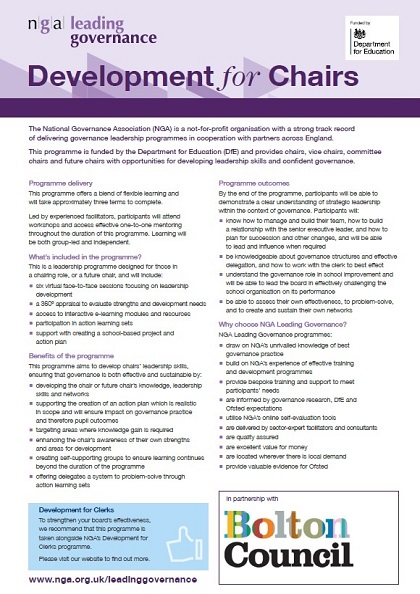Updates, News & Resources

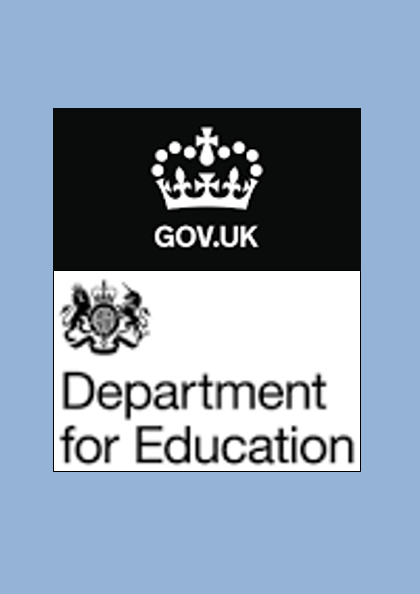
The Full Re-opening of Schools
Following the commencement of the re-opening off schools to all pupils from 8 March, the Department for Education (DfE) have published updated operational guidance to help schools to prepare. Routine graded Ofsted inspections will remain suspended for the spring term however, inspection arrangements will be kept under review. New elements to the DfE’s existing guidance on control measures include:
- Asymptomatic testing for all school staff, and for secondary school pupils
- Extended use of face coverings in secondary schools
- Wraparound care and extra-curricular activities to resume
- Providing reassurance for parents, pupils and staff who may be anxious about school re-opening
- Staggered start and finish times.
The revised guidance can be downloaded directly from the www.gov.uk website by following this LINK
Letter from Director – School Places for Children of Critical Workers
The Director of Children’s Services wrote to all parents and carers via schools on 13 January 2021, highlighting the demand on places for children of critical workers in the Borough. The letter confirms the latest advice following the press release in the local media.
A copy of the letter may be viewed by selecting ‘download’.
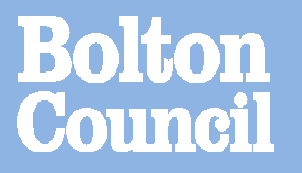
Bolton SEND Handbook
The new Bolton Special Educational Needs and Disability (SEND) Handbook was launched on 12 January 2021. This Handbook is a comprehensive guide to SEND, providing a range of information for all involved in working with children and young people to ensure that any additional needs are identified and met in a timely manner. The SEND Handbook contains a range of information including key legislation relating to SEND, the Early Help process and a document outlining what Quality First Teaching for those with additional needs should look like. The Handbook also contains information designed to support those working with children and young people to identify SEND as well as detailing what is expected at the school (SEN Support) level to meet a child’s needs through a graduated approach of assessment, planning, doing and reviewing. For those children and young people who require support above and beyond what a school is able to provide from their own resources, information relating to the process of requesting an Education, Health and Care Needs Assessment and the associated paperwork is also contained within the Handbook as is the documentation for the Annual Review of an Education, Health and Care Plan. An outline of the services available to support children and young people with SEND completes the Handbook.
A copy of the SEND Handbook can be found on the Bolton Local Offer website in the downloads section by following this LINK

Governance Services Support – Spring Term 2021
Following the announcement of a national lockdown from 5 January 2021 and the Government instruction to ‘stay at home’, we are once again recommending Boards to continue their business virtually until further notice. As a service, we are grateful for the continued strategic support that governors and trustees provide to their schools and leadership teams in these difficult times, as well as ensuring the health, safety and well-being of all staff and children.
With over 300 board meetings clerked in the autumn term, we know governors and trustees are much more confident in working via virtual means. We have updated our Virtual Meetings Protocols, available to download via the ‘Virtual Meeting’ page, which aim to provide further assistance with the smooth running of board meetings and re-affirm good practice. We have also added a new training video about the ‘Effective use of IT in Meetings’, which can be booked via the Training and Development Programme. The Training and Development Programme will continue to operate via live or pre-recorded events as well as he NGA e-learning sessions available to access any time, day or night, through your SLA subscription.
Remember your Clerk is available for support in all governance related matters, including providing assistance with virtual platforms, as are myself and all members of the Governance Services Team.
I want to thank you on behalf of the Team and wider Children’s Services Directorate for your continued support, and we look forward to seeing you again in person, when safe to do so. Until then, take care and stay safe.
John Ashworth – Governance Services Manager

DfE Guidance – Restricting Attendance During The National Lockwood
The Department for Education have issues new guidance as of 7 January 2021, for schools to use during the national lockdown period. Where this guidance refers to “schools”, that does not include maintained nursery schools or pre-reception classes.
Schools will be familiar with much of this guidance, including the system of controls, which they have been implementing since the start of the autumn term. Guidance has been updated where necessary to reflect the change to only some children attending on-site. The guidance includes new information relating to:
- Attendance – including confirmation of who should attend (including in alternative provision and special schools) and how attendance should be recorded
- Testing – including confirmation that the testing programme can continue in secondary schools
- Workforce – including advice for those who are extremely clinically vulnerable
- Free School Meals
- Educational visits – confirmation that no visits should take place during this period
- Remote education – including further information on remote education expectations
- Accountability expectations – including inspections, exams and assessments
A copy of the guidance can be downloaded directly from the www.gov.uk website by following this LINK

DfE Governance Update – December 2020
The DfE (Department for Education), as part of their regular governance update, have provided additional guidance to assist governors, trustees and school leaders in their governance roles. You may have already received this update if you are subscribed to the DfE GIAS (Get Information About Your Schools) system. The December briefing includes the following updates:
- Governing and trust boards meetings and visits into schools
- View my financial insights (VMFI) tool update (Academy trusts only)
- Diverse Governance Webcast Series
- Efficiency savings with Teaching Vacancies services
- ‘Something’s Not Right’ Home Office campaign
- Get funding and support to set up a digital education platform
- Information about the transition from the European Union for schools and academy trusts
The guidance can be gained directly from the www.gov.uk website by following this LINK
Bolton Communication and Language Pathway
The Bolton Communication and Language Pathway is a new multi-agency Pathway for Bolton supporting all children in their communication and language journey. It is imperative that all organisations involved in early years are familiar with the Communication and Language Pathway to support all children in their developmental journey.
In Bolton, there is a comprehensive offer which we want to ensure that all professionals are fully accessing. The Authority have developed documentation to clearly show Bolton’s integrated Communication and Language pathway which equips professionals with key knowledge and understanding of how to support children and families with speech, language and communication needs. There is also a funded training programme to support colleagues in schools.
To find out more about the Communication and Language offer in Bolton please contact a member of the Start Well Early Years Communication and Language Service on 01204 33 8349 or startwellbookings@bolton.gov.uk
A briefing note for Primary School Leaders and Governors may be downloaded here.

What Maintained Schools, Academies and Free Schools Must Publish Online
The Department for Education have updated their guidance in November 2020 about statutory information which must/should be published online for maintained Schools and academies and free schools.
The revised sections relate to a number of areas and may be accessed via the following links:
What maintained schools must publish online
What academies, free schools and colleges should publish online
The Clerking and Support Service will highlight the updates via the spring term board meetings, to ensure compliance.
Development for Chairs Programme 2021 ** Final Places Remaining **
Bolton Governance Services in partnership with the National Governance Association has once again been contracted to deliver the Development for Chairs Programme for Governors and Trustees. This is an excellent opportunity for existing, new or aspiring chairs of governors and a useful tool for succession planning.
The Development for Chairs programme continues to be funded by the Department for Education and provides delegates the opportunity to develop their leadership skills. The programme does require commitment but offers a blend of flexible learning, with three terms to complete.
Boards are also now able to secure funding for two places (The usual cost would be £500 per delegate). Further details and dates for the 2021 cohort may be downloaded below, with a closing date for submitted applications by 18 January 2021. Last few places remaining for the 2021 cohort.
Prior to booking, please contact Marie Foley on 01204 332116 or via email at marie.foley@bolton.gov.uk to register your interest or for further details about the programme.
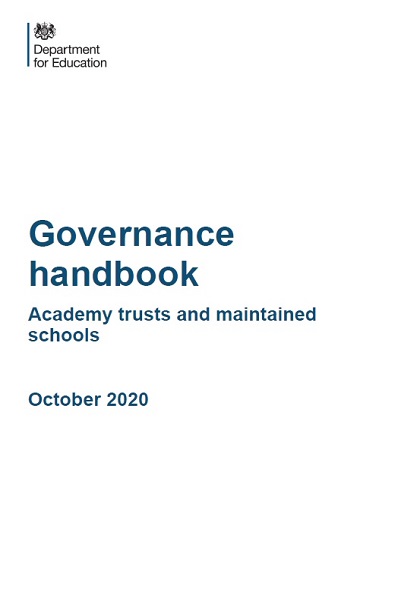
Governance Handbook – October 2020
The Department for Education’s Governance Handbook sets out the government’s vision and priorities for effective school and trust governance by:
- outlining the core role and functions of the governing board;
- summarising and providing a first point of reference on all the legal duties on boards, signposting to more detailed information, guidance and resources; and
- providing information on the support available to boards to be effective.
The Governance Handbook should be read alongside the department’s ‘Competency Framework for Governance’ and the ‘Clerking Competency Framework’, which describe the knowledge, skills and behaviours needed for effective governance and professional clerking. This guidance is also aligned to the Academies Financial Handbook (AFH), which academy trusts must comply with as a condition of their funding agreement.
The Governance Handbook may be downloaded directly from the DfE website via the following LINK

Governance Structures and Roles
The Department for Education have published two guidance documents that provide an explanation of how governing boards of maintained schools and academy trusts are structured and descriptions of the roles and responsibilities of members.
They aim to provide an introduction to the governance system across the education sector and can be used in inductions for new volunteers.
The Governance Structures and Roles documents may be downloaded directly from the DfE website via the following LINK
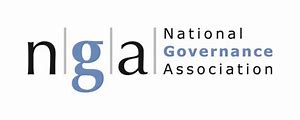
NGA – Time Management Tips for Chairs
The National Governance Association (NGA) provides a range of information, guidance and development opportunities to support chairs of governing boards in what is a complex and challenging role.
The NGA used their research into how chairs spend their time to create a number of time management tips. It is recognised that each chair brings unique skills, experience and circumstances to their role and the tips aim to provide some useful guidance.
The guidance may be viewed directly via the NGA website using the following LINK

Guidance for Schools During the Pandemic – November (update)
The DfE have updated the guidance on how the new national restrictions, which came into force from November 2020, will affect education and childcare settings. It builds upon guidance first published in July and revised in September.
The guidance continues the Government’s approach to prioritising pupils’ full time education in school. There are currently no plans for school closures or to implement rota systems. Any changes to attendance would be implemented as a last resort.
The DfE guidance may be viewed directly from the www.gov.uk website by following this LINK
The National Governance Association (NGA) has also updated its guidance for governing boards on business continuity with new content that looks forward to September when schools welcome back more pupils and governing boards also return to more normal business routines.
The NGA guidance may be downloaded directly from the NGA website by following this LINK
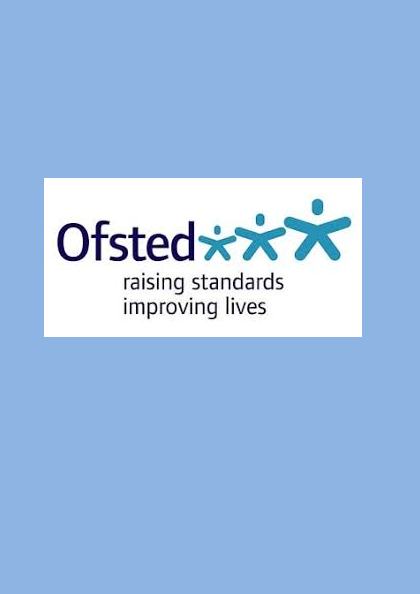
Schools and Early Education Inspection Update
On 1 October 2020, Ofsted have provided an update for inspectors and stakeholders with the latest information and guidance about Ofsted’s inspection work in schools and early education settings. The update whilst intended for inspectors is useful for all education professionals.
From October 2020, Ofsted will now be including relevant guidance and information for inspectors on early education inspection matters as well as for schools.
This edition includes a summary of Ofsted’s plans to restart work and their approach to the autumn term visits. Further information can be found via the www.gov.uk website by selecting the following LINK
Ofsted rolling updates to guidance and information relating to coronavirus (COVID-19) for schools, early years, children’s social care and further education and skills providers can be found via the www.gov.uk website by selecting the following LINK

Teachers & Support Staff Pay Award 2020
The Government have agreed all recommendations from the School Teachers Pay Review Body (STRB) in relation to the proposed pay award for teachers and school leaders working in maintained schools for the academic year 2020/21. This includes the introduction of advisory pay points on the main and upper pay range. As such the recommendation is as follows:
- A 5.5% uplift to the minimum of the MPR
- A 2.75% uplift to the minimum and maximum of all other pay ranges and allowances
- That advisory pay points are reintroduced on the MPR and UPR scales (proposed levels for these pay points can be found in the annex of the STRB report)
The pay award is for all maintained schools and academies that adopts the School Teachers Pay and Conditions.
National agreement has also been reached between the National Employers and Trade Unions and the pay increase applicable from 1 April 2020 has been accepted non-teaching support staff. For all National Joint Council (NJC), Soulbury and Chief Officer staff, pay points have been increased by 2.75%. Schools that do not purchase the Exchequer Service SLA will need to make their own arrangements to implement the pay award.
If you require any additional support or information regarding this matter, please do not hesitate to contact your nominated School HR Adviser.

Elective Home Education – Guidance for Schools
As pupils and students have returned to school from September, the Local Authority Achievement, Cohesion and Integration Service would like to remind schools of the process if they receive either an enquiry about home education or a notification of a child becoming home educated.
If parents make the decision to home educate then they need to put this in writing to the school. The school must then inform the Elective Home Education (EHE) Officer by sending a copy of the notification letter from parents and a completed EHE -Pupil Registration form.
A copy of the latest government guidance for parents which you as governors and trustees may be interested to read, and your schools may wish to share with parents who ask about home education, may be downloaded directly from the DfE website by selecting this LINK. If parents have enquiries about home education, schools should make them aware that their child will lose their and it will be allocated to another child. There is no guarantee that they will get a place at the same school or a school close to their home if they apply for a place at a later date.
If parents want further information about home education they can email or telephone the Elective Home Education officer, Kathryn Chatwin, on 01204 332309 or via email at ehe@bolton.gov.uk
If you would like to find out more about EHE then there is a short online course that can be accessed by selecting this LINK
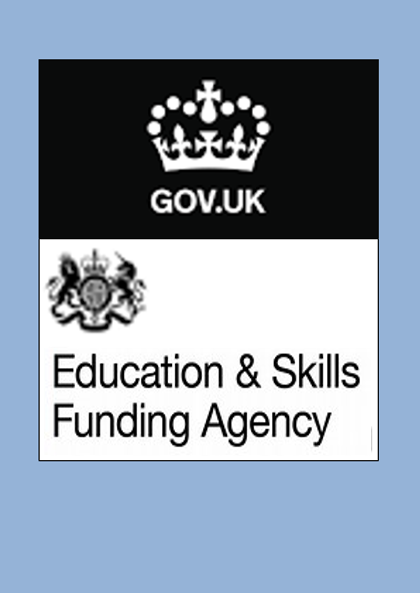
Academy Trust Financial Management Good Practice Guides
The Education Skills and Funding Agency (ESFA) has provided guidance and information outlining good practice in academy trust financial management and assurance. These guides are useful for academy trustees, accounting officers, principals/executive leaders and chief financial officers (CFOs).
These guides do not replace or modify any requirements set out in the Academies Financial Handbook (AFH) and the Academies Accounts Direction (AAD).
Further information can be found via the www.gov.uk website by selecting the following LINK

Best Practice Guidance for School Complaints Procedures 2020
The Department for Education (DfE) has released an update of their best practice guidance for school complaints procedures 2020.
From the start of the autumn term, the Department expects schools to continue to respond to new and existing complaints. However, they do not expect schools to respond if a tier 4 local restriction is in place or school access is restricted due to localised cases of coronavirus (COVID-19). Schools should still engage with parents and pupils where possible.
If a school is required to hold a complaints panel, this may be conducted via alternative means such as video conferencing. Where this is not possible then a face-to-face meeting may take place; however, participants must adhere to social distancing guidance under the school’s risk assessment processes.
Further information can be found via the www.gov.uk website by selecting the following LINK
Governance Services – Autumn Term 2020
Following on from the summer term, governors and trustees will be aware that the autumn term will continue to operate differently in light of the Pandemic and associated government guidance.
This will obviously have an impact on governance moving forward and as such as John Ashworth, Governance Services Manager, wrote to all Chairs and Head Teachers/Principals to provide further guidance for school and academy trust boards and details of what can be expected from the LA Governance Services Clerking and Support and Training and Development Services for the term ahead.
A copy of this letter may be downloaded here. If you have any individual queries about the content of this letter, please contact your Clerk to the Board in the first instance.

Changes to the School Exclusion Process During the Pandemic
The Department for Education (DfE) has published further statutory guidance that describes the temporary changes to the school exclusion process due to coronavirus (COVID-19) pandemic. The changes apply to exclusions from, maintained schools, academies (including alternative provision academies but excluding 16 to 19 academies) and pupil referral units (PRUs).
The normal arrangements and procedures that must follow a decision to exclude on disciplinary grounds are described in the 2017 statutory guidance ‘Exclusion from maintained schools, academies and pupil referral units in England’. They are unchanged except as noted in this guidance.
The revised guidance provides additional guidance in respect of remote access meetings and associated timelines and applies to exclusions that take place between 1 June 2020 until 24 September 2020 and 25 September 2020 until 31 March 2021.
The DfE guidance may be viewed directly from the www.gov.uk website by following this LINK


